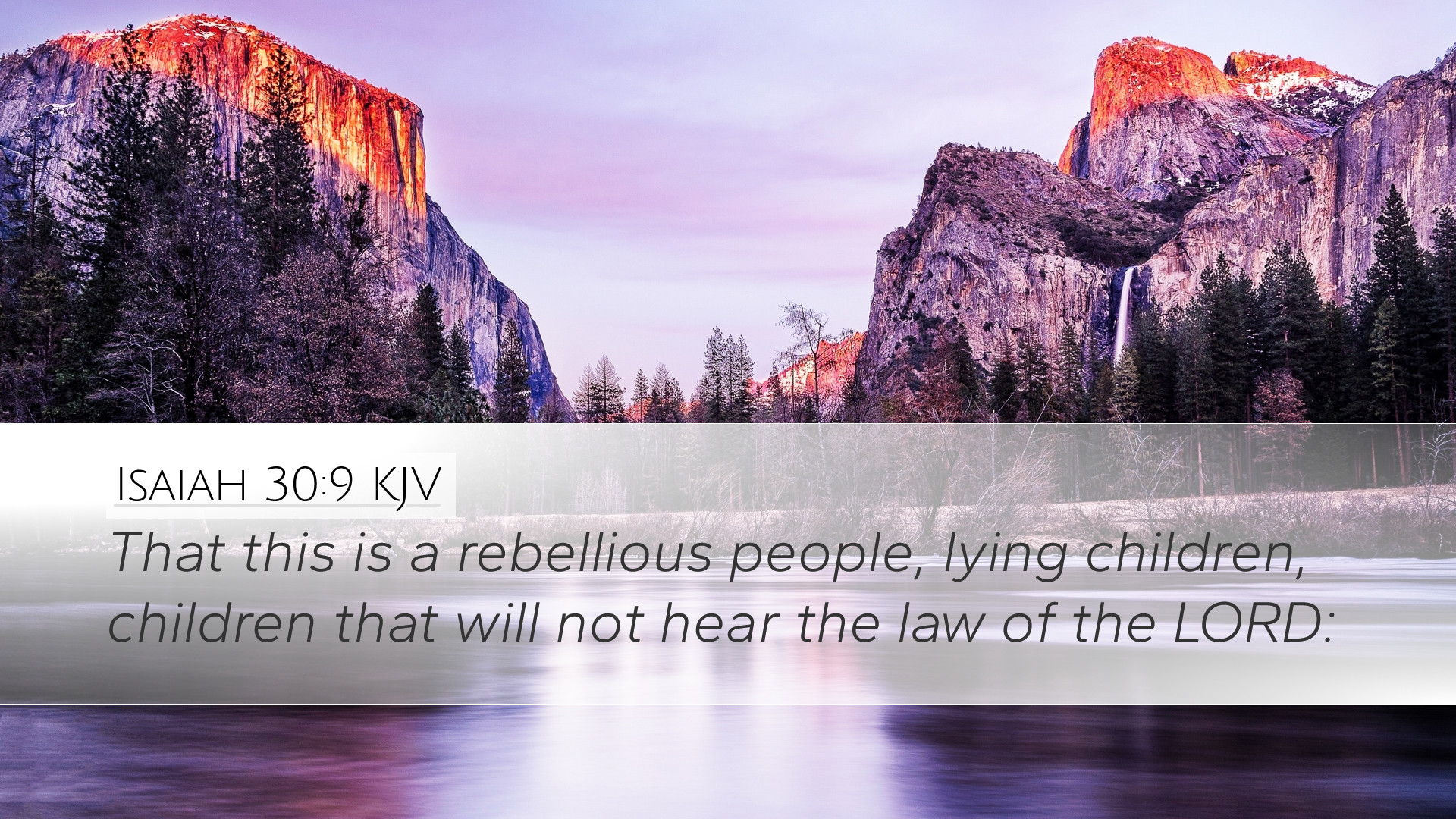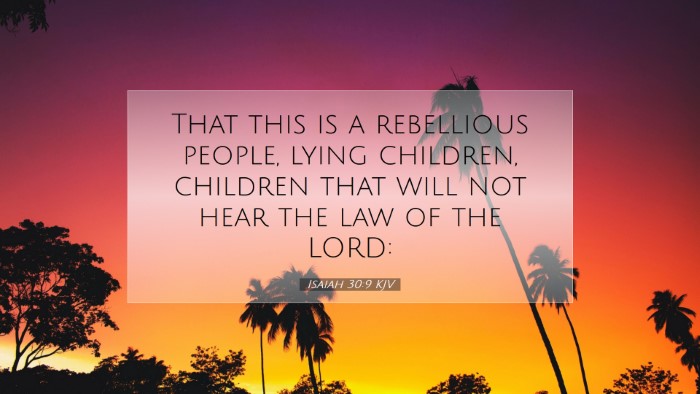Commentary on Isaiah 30:9
Isaiah 30:9: “That this is a rebellious people, lying children, children that will not hear the law of the LORD.”
This verse is paramount in understanding the broader context of the Book of Isaiah, especially regarding the attitudes of Israel and their relationship with God. The verse serves as an indictment of the people, emphasizing their persistent unwillingness to adhere to divine guidance.
General Themes
The themes of rebellion and disobedience resonate throughout the prophetic literature, particularly in Isaiah. This particular verse encapsulates the essence of the people's failure to recognize their need for divine instruction. The descriptors—“rebellious,” “lying,” and “children that will not hear”—paint a stark picture of a community steeped in disobedience.
Insights from Commentators
Matthew Henry's Commentary
Matthew Henry emphasizes the moral decay of the people, identifying their rebellion as a refusal to follow God’s commands. He notes that the phrase “lying children” suggests a deep-seated dishonesty within their hearts—both in their self-deception and in the ways they mislead others. Their “ears” are closed to the law of the Lord, indicative of a hardened spirit:
- Rebellious Attitude: Henry asserts that this rebellion stems from an unwillingness to submit to God’s authority.
- Lying Children: The term “lying” indicates not merely a lack of truthfulness but an active embrace of falsehood, suggesting they prefer false prophets to the true word of God.
- Oblivion to the Law: The refusal to hear the law marks a significant turning away from God’s covenant and the blessings associated with it.
Albert Barnes' Commentary
Albert Barnes approaches the verse with an analytical lens regarding the historical context of the Israelites, highlighting their rebellious nature particularly during times of crisis. Barnes points out:
- Historical Context: The prophet Isaiah was addressing a society in turmoil, where reliance on human alliances (like Egypt) overshadowed their faith in God.
- Rejection of God’s Counsel: Barnes notes that the people’s refusal to hear God's law indicates a systemic rejection of all forms of divine instruction, which leads to their eventual downfall.
- Empty Promises: He also highlights the irony of seeking security in falsehood, as those whom they follow will ultimately lead them away from truth.
Adam Clarke’s Commentary
Adam Clarke offers further elaboration, focusing on the psychological implications of the people's disobedience. He discusses:
- Moral Blindness: Clarke emphasizes that a rebellious spirit leads to moral and spiritual blindness, making it impossible for the people to perceive their actual condition.
- Lack of Willingness: The phrase “will not hear” suggests an active choice rather than a passive inability, indicating deep-rooted rebellion against divine authority.
- Consequences of Rebellion: Clarke warns of the dire spiritual consequences that shall follow if the people continue down this path of defiance against the law of God.
Theological Reflections
This verse demands a theological reflection on human nature and the inclination towards sin. The Israelites’ narrative serves as a cautionary tale for all believers regarding the dangers of ignoring divine counsel.
- Human Condition: The description of the people resonates with the universal human condition—tendency toward rebellion against God’s law.
- Divine Patience: Despite their obstinacy, God’s patience remains evident, extending opportunities for repentance and restoration.
- Call to Obedience: For contemporary readers, this verse serves as a stark reminder of the call to vigilance in hearing and obeying God’s word.
Application for Pastors and Theologians
As pastors and theologians reflect on Isaiah 30:9, several applications arise:
- Preaching Apathy: Pastors must be vigilant against complacency in their congregations, understanding that the unwillingness to hear God’s word can lead to spiritual desolation.
- Teaching Truth: Emphasizing the importance of teaching biblical truth, reminding congregations that adherence to the law is a pathway to life and fulfillment of God’s promises.
- Encouragement for Repentance: Encouraging congregations to confront their own rebellious tendencies and seek restoration through genuine repentance.
Conclusion
Isaiah 30:9 is a profound verse that serves as both a warning and an exhortation. The rebellion described is not merely historical but a recurring theme in human behavior. By understanding the implications of this verse and reflecting on the insights of esteemed commentators, pastors, students, and scholars can derive valuable lessons that resonate with today’s society and worship practices.


